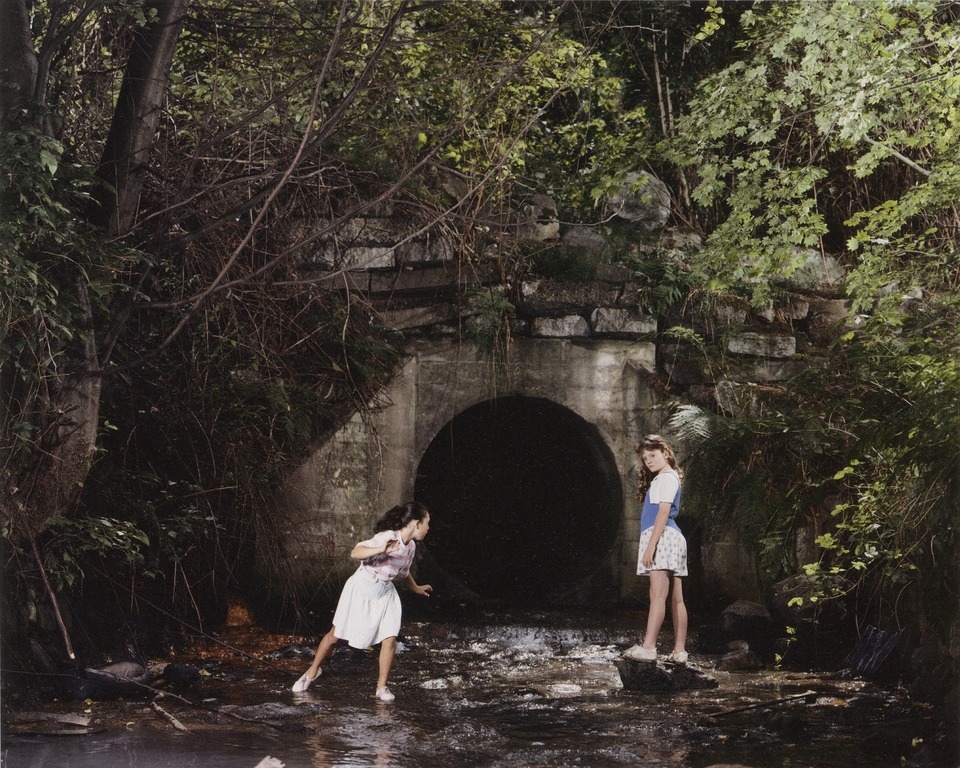CLEAR!
Ok. We're back. This blog died for a little but it's now back up again.
This is on today's class, Tuesday February 5th, in which we finished the movie "Manufactured Landscapes" and saw some Canadian photography work, most notably from the National Film Board's Still Photo Division and the United State's exhibition "The Family of Man" in the 1950's. Later we saw artists Robert Frank, Michel Lambeth, Lutz Dille and George Zimbel. Later (from the 70's) we talked of Jeff Wall's cibachrome photographs and the Sanchez Brother's theatrically set-up photographs.
It was probably the fine line photography can draw between fiction and reality, and the creepy magical quality of the photographs that kept making me think of Peter Pan.
Probably that, and a few themes and conversations such as those we had about William Eugene Smith's "The Walk to Paradise Garden", and the visual prompt of Jeff Wall's "The Drain" (both below).
 |
| "The Walk to Paradise Garden" photograph (1946) by William Eugene Smith. |
 |
| "The Drain" by Jeff Wall, 229x287cm cibachrome (1989). |
Why Peter Pan? Well, on a recent movie-watching binge *cough cough, yesterday, cough*, I slipped into the wonderful land of life-inspired fiction with Marc Forster's Finding Neverland. Ignore the formulaic Hollywood film-trailer (breaks the magic for me) and have a look at the trailer below if you're curious. I've mentioned having seeing and loved the movie Hugo too, and between then and now I also re-visited Pan's Labyrinth, which has great monsters!
I love how both film and photography lend themselves so readily to creating a convincing fictional world, perhaps because we are so used to taking what we see as reality. Also, you'll notice that these images have a lot to do with children's worlds, crossing over into adult's, or perhaps more accurately adults reminiscing about childhood and seeing their world as magical and perhaps better than the one they grew up into.
Do I think this to be true? No, not really. Johnny Depp's character, author of Peter Pan J.M. Barrie, probably has it the most figured out, as do the writers of Pan's Labyrinth. Children's worlds are not flawless or oblivious to adult problems, and appreciate honesty. In Finding Neverland, the Davies brothers very well understand that their mother is dying, and are incredibly (and understandably) frustrated that no one will tell them what is going on. Mr Barrie is probably the most straight-forward to them, although still a protective role model.
Are children's worlds innocent? Yes and no. Children need to be protected, but children's worlds are rough terrains with intricate narratives of good and evil, as the best children's authors demonstrate.
A good example is the work of the Alsacian satirist and illustrator Tomi Ungerer (click for his official website).
 |
| In Strasbourg, a poster for the Tomi Ungerer on a tramway bus stop. So many things I love in one picture! |
It's surprising when you realize that in all your books, it's actually the bad guys who are the heroes.
To which Tomi replies: What impassions me is the no-man's land between good and evil. I think that everyone can learn from each other. I especially want to show that what counts in life is to respect [others] and to smile.
I think that Mr Ungerer shows great respect to children this way, understanding that they are able to grasp much more complex situations than we give them credit for while stimulating their imaginations. And I really respect that.

Aucun commentaire:
Enregistrer un commentaire